Via Pete Caldera, the Yankees have “sharply limited” Javy Vazquez’s work since his last start due to concerns about the utter lack of life on his fastball. Pitching coach Dave Eiland referred to it is “less volume, less intensity,” which for all intents and purposes means they had Javy scale back his between-start throwing hoping it would take care of this dead arm phase. The righthander’s velocity has been down all season and even moreso in his last few starts, but with Andy Pettitte on the shelf and a slim lead in the division, they can’t exactly skip him a start or two right now.
Javy Vazquez and the arbitration question
I posted the following at MLBTR on Thursday, but it’s relevant to the Yankees so I’m going to syndicate it here for discussion purposes …

The Yankees haven’t offered a single free agent, Type-A or B, arbitration in either of the last two years because they were afraid of getting stuck with an unwanted player at an unwanted price (had they accepted), but it stood to reason that they would make such an offer to righthander Javier Vazquez. As one of the game’s few true workhorses with a long track record, he was all but a lock to decline arbitration after 2010 and seek a multi-year deal (perhaps his last) elsewhere. Now four months into the season, suddenly that scenario doesn’t seem as likely.
Vazquez’s season has been quite the roller coaster. The 34-year-old posted a 9.78 ERA in his first five starts, a 2.75 ERA in his next 11, and then a 6.43 ERA in his last five outings. The team has indicated that he’s currently battling through a “dead arm” period, and last night Vazquez himself acknowledged that he’s got a lot of miles on his arm and they may be catching up to him. Only Livan Hernandez has thrown more innings since the start of the 2000 season, and Javy’s fastball velocity is down noticeably this season.
In the grand scheme of things, Vazquez’s strikeout (7.0 K/9) and walk (3.5 BB/9) rates this season are among the worst of his career, and he’s on pace to throw slightly more than 176 innings, which would be his lowest total since 1999. Still, he’s well on his way to being a Type-A free agent after the season, but given his underwhelming performance and that aforementioned workload, an arbitration offer becomes a much riskier proposition.
With an $11.5MM salary this season, the Yankees would have to consider the possibility of Vazquez accepting arbitration and receiving a salary upwards of $13MM next season. We laugh at the idea of the Yanks having a budget, but that could put a serious dent in the payroll with the team expected to heavily pursue Cliff Lee.
When the Yankees re-acquired Vazquez from the Braves in the offseason, they apparently considered two draft picks part of the package since he comfortably projected to be a Type-A free agent. It’s easy to understand why they’d think that following a season in which he placed fourth in the Cy Young voting, but as it tends to do, time may have changed things.
* * *
That’s the dumbed down version of the situation awaiting the Yankees and Vazquez after the season, but you all know what’s going on. Personally, I wouldn’t offer him arbitration because there’s so much risk involved right now. Javy’s clearly not the guy he was White Sox any more, let along the guy he was with the Braves last year. The velocity’s down, he’s obviously very aware of it, and the potential of getting stuck with him for $13M+ next year (even on a one year deal) is too great for my liking.
I like draft picks as much as anyone, especially when you’re talking about next year’s epiphany draft, but I like not overpaying for declining players even more. If Vazquez can’t find a multi-year deal on the open market, which is not out of the question given the current market and economy, he’ll accept arbitration like Carl Pavano and Rafael Soriano did last year. I wouldn’t risk it, but that’s just me.
Javy Vazquez and the lost fastball velocity
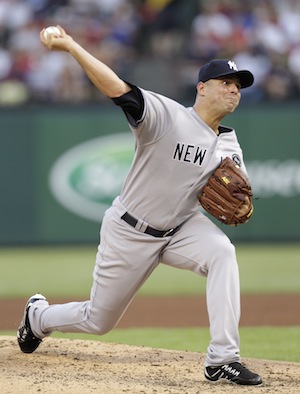
Lost in the aftermath of a thrilling Yankee victory last night was another mediocre start by Javier Vazquez. Pitching in temperatures nearing 100 degrees, Vazquez, thanks in part to his defense, labored through 4.1 innings, and his final line — 8 H, 6 ER, 2 BB, 1 K — doesn’t do much to inspire confidence. After a great run through late May, June and the first half of July, Javier Vazquez has seemingly run out of steam.
Last night’s affair caps off a rough stretch for Vazquez. Over his last 28 innings, he’s allowed 20 earned runs for a 6.43 ERA while giving up 36 hits and seven home runs with 10 walks and just 15 strike outs. His FIP clocks in at 6.35, and while earlier this season he couldn’t locate his pitches, this time, he doesn’t seem to have much on them.
“It’s been very frustrating for me, the velocity,” Vazquez said after his start. “I don’t have any life on my fastball. All the swings and misses I’m getting are on my change-ups and curveballs.”
The results bare out the pitcher’s own observations. Of the 82 pitches Vazquez threw last night, the Rangers swung and missed at just four of them. According to the Pitch F/X data, those swings came on pitches that were 77, 75, 68 and 65 miles an hour. In other words, none of them were on fastballs.
As with last week’s outing against the Red Sox, Vazquez’s heaters weren’t too hot. He started the game out with a few heaters that didn’t crack 85 and hit 88 only once in the first inning. The fastest pitches he threw were a pair of four-seamers in the third that just eked above the 89-mph mark and the final pitch of his outing. For the first time all season, his fastball velocity never cracked 90.
Vazquez, as the Yanks said last weekend, has been going through a dead-arm period, and he doesn’t need his velocity to excel. As Mike Mussina showed, smart pitchers with pinpoint command and very good breaking pitches — two traits Vazquez possesses — can keep hitters guessing with a slow-slower-slowest approach to pitching. The Yankees need that from Javy right now.
In an ideal world, the 34-year-old with the fifth most innings pitched among active players would get some time off before the playoffs. But when it comes to starting pitching, the Yankees are a little short-handed right now. Andy Pettitte is still a week to ten days away from rejoining the team, and Phil Hughes is fast approaching the magic 175 IP mark, his soft cap for an innings limit. If the Yankees need to monitor Hughes’ workload to keep him fresh for the playoffs, they can’t ease up on Vazquez at the same time. When Pettitte comes back, the Yanks can use Dustin Moseley to give Vazquez an extra day off now and then, but until then, their starters must go on turn.
So the Yanks will continue to run Javy out there every five days. Without an extra pitcher — say a Cliff Lee — the team has few options, and despite the results, it’s an easy choice to make. They won’t overtax Hughes, a future starting pitcher, to coddle Javier Vazquez, a one-year rental. Instead, they’ll hope he can make the best of it and work through a dead arm period. With no days off until the 26th, the Yankees are going full steam ahead through the dog days of August.
As the fans sigh in frustration at another slow fastball, though, Vazquez does as well. “I’ve got a lot of innings on my arm,” he aid after yesterday’s game. “Maybe it’s catching up to me. I reach back and see 88. It’s kind of frustrating.”
Yanks battle back to beat the Rangers

Sometimes a game feels like two games. Sometimes that’s because of the action. Other times it’s because of the length. Last night’s was both. The Rangers did all their damage in the first five innings, while the Yanks brought the drama in the final four. The game time was three hours, 45 minutes, which added to the dual-game feel. But two games or one, the Yanks came away with the victory and extended their lead in the AL East.
Biggest Hit: The Captain ties it
With so many important points in the game it’s tough to pick just one that stands out as the most important. But if we have to, it’s going to be the hit that ties the game in the ninth. That came off the bat of Derek Jeter. Though he had plenty of help setting up the situation.
After pitching two innings in Tuesday’s game, Neftali Feliz got the call to hold the Rangers’ one-run lead in the ninth. Lance Berkman got the first crack at him and put together his best at-bat to date as a Yankee. Feliz threw nothing but fastballs, but Berkman stayed on them. He fouled off the first, took the second, and then swung through the third. From there he took two out of the zone, fouled off two, and then finally took the last one for ball four. It was quite the effort by Berkman, and it resulted in the tying run heading to first base.
That tying run wouldn’t be Berkman, though, but rather Curtis Granderson. That changes the game in two ways. First, it gives the Yanks considerably more speed on the bases. Second, it can distract the pitcher. To the latter point, Feliz threw over to first five times, one before each of the first five pitches. Before the sixth, in a 2-2 count to Brett Gardner, Feliz declined to throw over. Instead he threw his 14th straight fastball. Gardner dunked it into left for a base hit.
This set up Jeter well, but not perfectly. The tying and go-ahead runs were on base, and they were the fastest guys on the team. It didn’t take long for the situation to become perfect. On the second pitch, Feliz’s 16th straight fastball, the ball sailed away, above Bengie Molina’s head and to the backstop. It bounced right back to Molina, but even a perfect throw couldn’t get Granderson. The double play possibility was off, leaving Jeter with even more wiggle room.
He used every bit of it on the next pitch, Feliz’s 17th straight fastball, as he chopped it towards the middle. With the infield drawn it it squeezed through and got into center, which allowed Granderson to score the tying run. Gardner held up for a moment to make sure the ball got through. Had he been going on contact I’m confident he would have scored the go-ahead run right there.
Feliz finally went to the slider against Nick Swisher. Unsurprisingly it worked out, as Swisher went down swinging again. For those who like the phrase, that was the Golden Sombrero for him. But, after having thrown two innings on Tuesday and 20 pitches in last night’s game, Feliz was done. The game was left to a lesser pitcher from the Rangers’ bullpen. I’m not sure what was less surprising, Swisher’s strikeout or the Rangers’ bullpen giving the Yanks the lead.
MVP: Marcus Thames

Jeter might have been the hero with the tying run, but Marcus Thames did everything he could to help his team win the game. Normally he’d get a slot in the Miscellany section, but for his 3 for 5 night, which included a homer and the go-ahead single, he gets his own little section.
Thames’s homer in the eighth was what made me think the Yanks could come back. Frank Francisco is prone to the meltdown, and Thames’s leadoff homer made it seem like one was imminent. And it was. Austin Kearns bailed him out by missing a 3-1 meatball, which is a shame. But make no mistake: the Yanks had designs on this game in the eighth, and Marcus Thames led the charge. It’s fitting, then, that he drove home Gardner with a sharp groundball single.
Good things happen when Thames gets to hit but doesn’t have to play the field.
Ninth inning Leverage Index
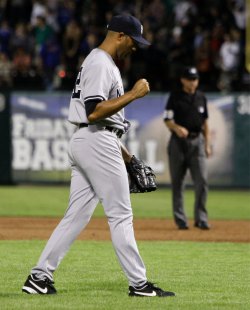
Mariano Rivera remains the same on the mound no matter the situation. Whether it’s the bottom of the order with a three-run lead or it’s the top of the order with his team ahead just one run, Mariano stands there like Seneca, poised and stoical. In the ninth inning last night he not only had to protect a lead of a single run, but had to face the top of the Rangers order to do so.
The first batter, Elvis Andrus, came to the plate with a Leverage Index of 3.60. He didn’t feel the pressure, though, as he smacked one into the right-center gap, not only splitting Kearns and Granderson, but also hitting it to a deeper part of the park. That allowed him to take third base, which gave the Rangers an excellent chance to tie the game. That actually brought Texas’s win expectancy above 50 percent.
Michael Young batted next, and he actually faced a lower LI. Mo jammed him on the first pitch, and young popped one up to shallow right. Austin Kearns, making up for his rally killing double play in the eighth, sprinted in and made a shoestring catch to record the out. Andrus probably wouldn’t have scored in any case, but the out was big. It also increased the leverage dramatically.
The Rangers’ best hitter and MVP candidate Josh Hamilton batted next. This time the LI was 5.76. Mo did not feel the pressure. He just does what he normally does, which is to pump cutters. The first two crossed a bit too far inside, but on the 2-0 pitch Mo hit his spot. Hamilton tapped it weakly right back to Rivera for the second out. That left just one more batter.
Again the pressure was high. The Rangers’ win expectancy had fallen all the way to 17.2 percent, but they still had that tying run 90 feet away. Mo delivered a cutter, and again missed. He didn’t with the next. Guerrero pulled the thigh-high cutter right to A-Rod at third, who threw across the diamond to end the game.
On Javy

I’m torn on how to evaluate Javier Vazquez’s start. On the one hand, he allowed six runs in 4.1 innings, which is never good. On the other hand, he got some bad breaks along the way. There was no way anyone could rate this as a good, or even decent, start. But it was something less than the disaster that the scoreboard suggested.
The first run, a solo homer by Michael Young, just barely caught the foul pole in right. That’ll happen. No biggie. Even Cliff Lee will give up a run from time to time. But then in the fourth Javy gave up two more, and with Lee on the mound the game felt bleak. But I wasn’t killing Javy. The runs scored on a ball that Cano nearly fielded. And in any case, the Yanks shouldn’t have been in that situation. Why they thought it appropriate to walk David Murphy with two outs is beyond me. Javy got him to pop up in his first AB. Let him face the guy. It’s not like they were setting up the double play or anything.
(Still, can’t give Javy a complete pass here. He did walk Bengie Molina, which is hard enough on its own, but he did it after being ahead 0-2. Poor form, Javy. Poor form.)
He allowed another run in the fifth, this off the bat of Josh Hamilton. It’s a forgivable offense, but Javy was running out of rope there. Thankfully he rebounded, getting Vlad to bounce right back to him and then Nelson Cruz to hit one towards A-Rod. That prevented the run from scoring, as A-Rod threw home. But Jorge Posada botched the rundown and allowed Young to return to third safely. That became huge, because Murphy then singled and drove in two.
Yay bullpen
Sergio Mitre came on in relief of Vazquez and got Molina to fly out. For some reason Nelson Cruz thought it appropriate to tag up. With a break-even rate of roughly 100 percent, there’s no excuse for getting thrown out there. Cruz did, and he let the Yanks off the hook.
Mitre came out to pitch a scoreless sixth, and then Kerry Wood followed with two scoreless innings. Clearly, they’re stretching him out to be a starter down the stretch.
The Yanks offense did the coming back, but without solid work from Mitre and Wood they wouldn’t have gotten there in the first place. Hats off to them. I’ve noticed far fewer people complaining about the bullpen these days.
Miscellany
Any time you score four runs off Cliff Lee you can pat yourself on the back. Good job by the offense.
After the Rangers broke it open in the fifth, the Yanks immediately fought back. Or, should I say, Jeter fought back. He tripled to lead off the sixth and eventually scored on a wild pitch. He’s damn lucky on that one, since the next three batters struck out swinging. That was Lee’s first wild pitch of the season.
Lee had an odd line. He gave up eight hits, four for extra bases, but struck out 11. And, of course, he walked none. Anything more would be unsuitable.
Derek Jeter apparently does not appreciate it when people say he shouldn’t be the leadoff hitter.
Box and graph
The graph gets kinda crazy there towards the end.
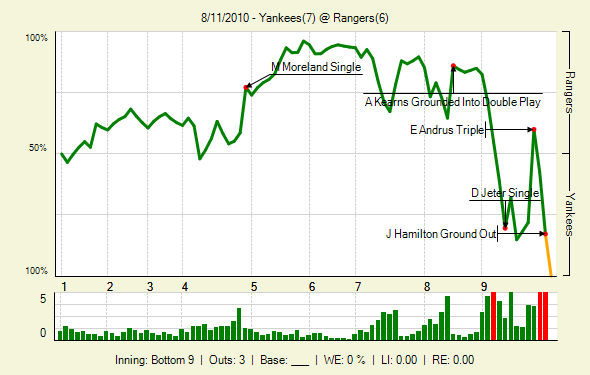
More at FanGraphs. Traditional numbers here.
Up Next
The Yanks travel north to Kansas City to battle the Royals. Bruce Chen vs. CC Sabathia, Same CDT start of 8:10.
Vazquez suffering through dead-arm period
During his start last night against the Red Sox, Javier Vazquez raised some eyebrows when his first-inning fastballs were sitting at 81-85 miles per hour. Today, reports ESPN’s Andrew Marchand, the Yankees say Vazquez is suffering through a dead-arm period. Pitching coach Dave Eiland says the Yanks will curtail Vazquez’s work between starts, and the right-hander says he feels ok. Still, the Yanks noticed the big dip in velocity yesterday and will probably send Vazquez for more tests just to make sure nothing is wrong structurally.
Javy’s season comes into clearer view
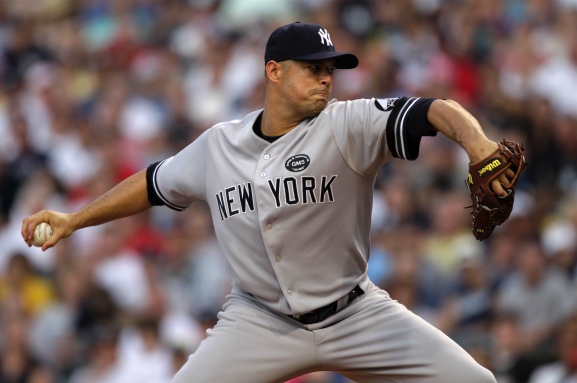
Last time through the rotation Javy Vazquez blew through the Angels’ order, using just 37 pitches to record the first 12 outs. This time it took him 45 pitches to record those first 12 outs, but the difference was that he kept cruising after that. He completed the seventh and even came out for the eighth, using 102 pitches (64 strikes) to keep his team within striking distance. It seems like he’s doing that in almost every game now. That’s quite a change from the beginning of the season.
At this point we can draw a few conclusions about Javy’s season. For instance, he’s clearly lost a bit on his fastball. In good starts and in bad he’s averaging around 89 mph, after averaging around 91 mph for most of his career. That has led to a number of changes in his numbers, including an decreased strikeout rate, increased walk rate, and increased home run rate. Of course, some of that is attributable to his ugly first five starts, which he has put behind him. It warrants a bit closer look to see what has changed since the beginning.
Home runs stand out the most, because they do the most damage. Javy has surrendered 18 of them this year, which has led to a career-high rate of 1.51 per nine. Eight of those came in his first five starts, meaning he has surrendered just 10 in his latest 13 starts, a much more palatable number (1.07 per nine). Opponents are putting the ball in the air frequently, 47.4 percent, a number that, if anything, has gone up as he’s gotten better.
The added fly balls do have a side benefit. While ground balls suppress extra base hits, fly balls suppress base hits in general. The AL is hitting .231 on groundballs, but is hitting .222 on fly balls (.142 BABIP because of the sac flies). This helps explain Javy’s .255 BABIP. It might seem unsustainably low, and I do suspect that we’ll see something of an uptick in it. I’m not sure when that will happen — after all, he does have a .221 BABIP in his last 13 starts.
His walk rate, 3.45 per nine, is quite high for him, but again comes mostly from the beginning of the season, when he displayed no command of his fastball. In his last 13 starts he has walked 2.79 per nine, still a bit above his normal numbers but understandable given his change of scenery and diminished fastball. Those facts also have affected his strikeout rate, which is at just 7.23 per nine. There’s little chance he recovers those lost strikeouts, but it seems he’s made some other adjustments.
In terms of pitches, it seems he has all but ditched the slider. While it rated at 3.0 runs above average last season, it was the worst of his four pitches. This year it rates at 0.2 runs above average, better than his curve and change, which rank in the negatives. Yet this could be more indicative of how pitch type values measures runs above average. In his first five starts he threw his slider 16.1 percent of the time, mixing it well with his curve and change. He threw it for strikes, 62.7 percent, and got batters to swing and miss on 12 percent of them. Yet something just wasn’t working with it.
In his last 13 starts he has cut down on the slider usage greatly, throwing it 10.6 percent, less frequently than all of his other pitches. He has gone more to the change and the curveball. The change has become his weapon of choice, as he’s deployed it 19.8 percent of the time and has seen a 14.8 percent whiff rate. As for the slider, he’s seeing fewer swings and misses, 9.5 percent, as he throws it less often, but he’s also seeing fewer of them, 14.6 percent, put in play. Back when he was throwing it more often opponents put it in play 21.3 percent of the time.
This is not, in other words, the Javier Vazquez who contended for the Cy Young last year. He’s not the guy who will strike out more than a batter per inning and refuse to issue the free pass. He’s not the guy with four lights out pitches who will go to any one in any situation. Instead he’s a veteran who’s learning to survive with diminished stuff. It caught him off-guard earlier in the season, and it took him five starts to finally realize his limitations. He’s made those adjustments, though, and it shows in the results. Javy might not be a top of the rotation starter, but he provides stability to these Yankees.
Yanks win an odd one against the Angels
For four innings this seemed like a typical rebound game. After getting their asses kicked last night the Yanks scored six runs in four innings while holding the Angels scoreless. Javier Vazquez had thrown just 37 pitches through those four innings, and it didn’t look like the Angels had much of a chance. But from the fifth inning on it became anything but a typical ballgame.
Biggest Hit: Miranda takes out an insurance policy (WPA) and Cano’s tater (subjective)
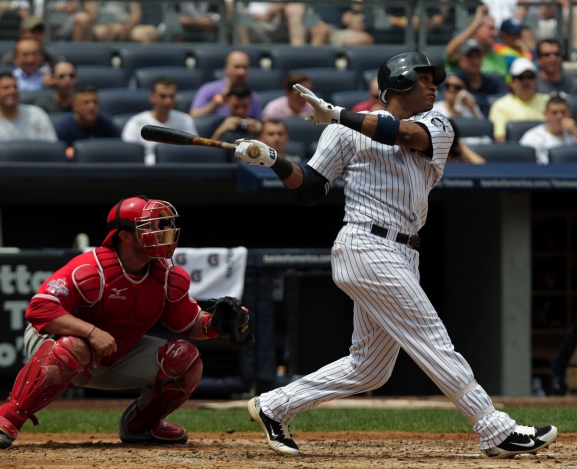
The aim of WPA, as I see it, is to capture the essence of the moment. Given the current base-out state and score situation it can, using data from thousands of games, describe how important a certain moment or event appears. Of course, you can’t always capture emotion in a number. When it comes to important moments in a game I’ll sometimes argue with the value WPA assigns to it. Today we’ll split the difference.
Heading into the bottom of the seventh the Yanks were walking a tightrope. In a matter of two innings they saw their 6-0 lead cut all the way to 6-5. The Angels mounted a few threats that the bullpen quelled, but it still felt like heartbreak could be a few pitches away. That’s why Juan Miranda’s one-out solo home run in the bottom of the seventh was so important.
Scot Shields got Cano to, once again, chase a pitch at his eyes to cap a three-pitch strikeout. That brought up Juan Miranda, 0 for 3 to that point, with none on and one out. On the 2-1 pitch Shields delivered a fastball up and over the plate, and Miranda laid into it, sending it into the Yanks’ bullpen for some much-needed insurance. Even the one additional run made the lead seem so much safer.
To me, though, the biggest hit came earlier, during the four-run third. The Yanks had rallied on a Jeter single, Swisher double, and Teixeira single to extend the lead to four. Two batters later Robinson Cano took a 2-0 sinker over the center field wall to break open the game. At that point, with Vazquez cruising, it felt like a comfortable game.
Biggest Pitch: Joba gets another grounder
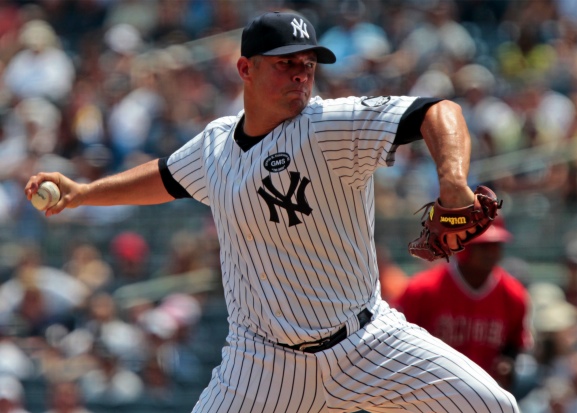
I don’t know what happened to Javy. I don’t think Javy knows what happened to Javy. Girardi explained it as him trying too hard to avoid the walk. It could be that. It’s definitely not something you see every day from a pitcher who was going so well earlier in the game. David Robertson then worked himself into a jam in the sixth but got out of it in what was the second biggest pitch of the game. He ran the count to 3-1 on Howie Kendrick before getting him to line out on a high fastball.
In the seventh, Girardi went to Boone Logan, who retired both lefties and allowed a single to the righty Torii Hunter. With another righty, Mike Napoli, due up, Girardi went to Joba Chamberlain for the final out. He basically let Hunter steal second, and then on a 3-2 count missed low with a fastball to put on Napoli. It looked like he’d get out of it when Juan Rivera hit a chopper towards third, but it was hit too weakly and everyone reached safely. For the second inning in a row the Yankees faced a bases loaded jam, and for the second inning in a row they avoided damage. Kevin Frandsen grounded to A-Rod, who stepped on third to end the inning.
The bullpen did a great job, Joba’s eighth aside, for the second time in three games. The relief corps remains one of the weaker parts of this team, but they’ve come through lately and have helped deliver two big wins.
Miscellany
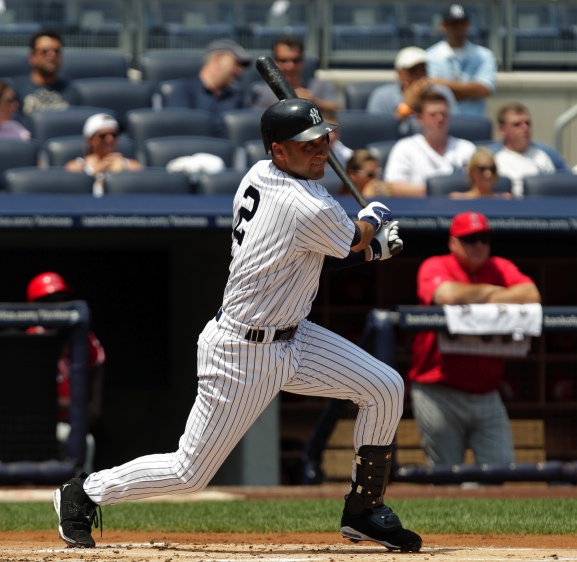
Derek Jeter had a nice-looking day. He’ll go on a tear sometime later this month into August. Just watch.
If I didn’t know better I’d think that Nick Swisher has a chance to hit .300 this year. It looks like he can hit anything up there. He looked especially good in the third when he waited back on a curveball and served it back into center for a base hit.
With this 3 for 5, two-double night, Mark Teixeira’s line is up to .256/.366/.471. I have August 8 in the pool of when he’ll get his SLG over .500.
A-Rod has struck out only 4 times in his last 40 AB.
As Chad Jennings notes, Robinson Cano hadn’t been intentionally walked twice in a game since 2007.
For the second time this season Juan Miranda homered off a pitcher with the last name Shields. He hit one off James on May 20.
Granderson looked good, going 2 for 4. If it takes a critical article every day to get him going, I’m up to the task.
Yesterday was Cervelli’s 10th multi-hit game in 49 starts.
Brett Gardner lost a chance to bring his batting average back over .300 when he got ejected, for the first time in his career, in the seventh.
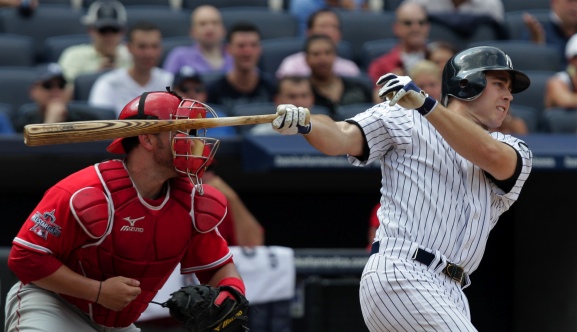
Colin Curtis, who hit his first career home run, is the only player in the league with the last name Curtis. There are only two players whose first name is Curtis.
And finally, Michael Kay got all riled up for an A-Rod fly ball that didn’t even push Matsui to the warning track, but showed no emotion when, one batter later, Robinson Cano put a ball in the bullpen to give the Yanks a 5-0 lead.
Box, graph, and highlights
Poppa, what does the tall red bar mean?
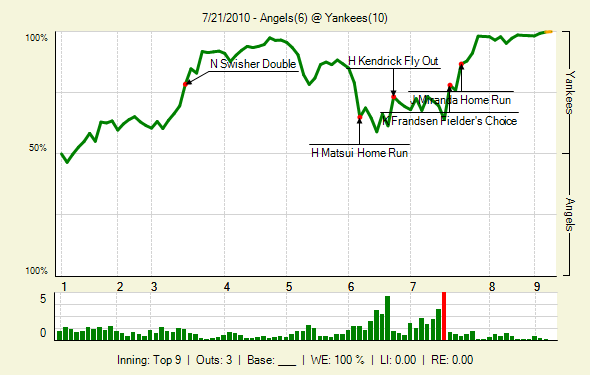
More at FanGraphs. Also: traditional box and highlights.
Up Next
The Royals come to town for a four-game set. Thanks to the luck of the draw, Zack Greinke pitched on Wednesday, and so he won’t face the Yankees. Bruce Chen will square off against CC Sabathia at 7:05 p.m. tonight, and the Yankees will hope their starting pitcher can make it through six innings for the first time since CC’s last outing.
- « Previous Page
- 1
- 2
- 3
- 4
- 5
- 6
- …
- 9
- Next Page »